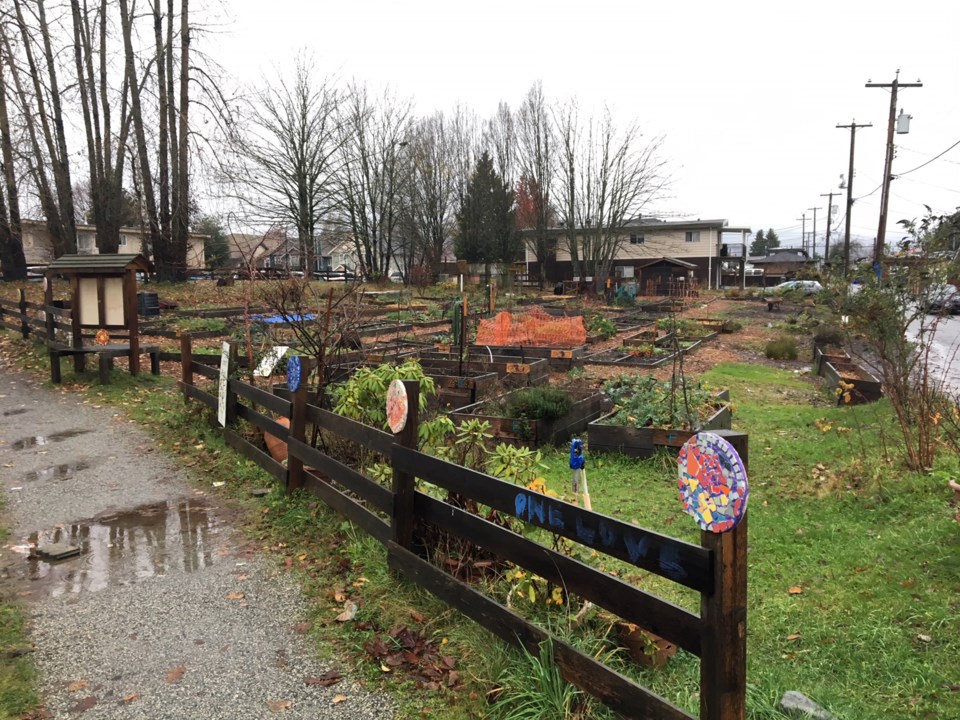The city announced Friday that it has identified another property in Vancouver that will be home to a 50-unit temporary modular housing complex for homeless people.
This one is at 4410 Kaslo St., near the 29th Avenue SkyTrain station and will mean the relocation of the Still Creek community garden. The city owns the property and expects the housing to open in the spring.
Abi Bond, the city’s director of housing and policy projects, said open houses will be held Dec. 13 and 14 to give residents more details about the housing. But Bond noted the city has already been speaking to gardeners, the park board and the Collingwood neighbourhood house, which has existing programs for the homeless.
“I don’t know what the community reaction will be,” she said. “We’ll be there to listen to people's concerns and talk it through with people, and have that dialogue about how the building will be managed safely, managed responsibly.”
The property is the fourth to be announced by the city as a location for temporary modular housing. The others are at West 59th Avenue and Heather Street, the 1100-block Franklin Street and 501 Powell St. A 78-unit complex at the Heather Street property is expected to open in February.
Marpole residents opposed to the Heather Street complex were expected to hold a news conference at city hall Friday morning, prior to the Courier’s deadline. Meanwhile, students from the same neighbourhood have organized a welcoming party next Tuesday for tenants.
Gil Kelley, the city’s director of planning, has jurisdiction to approve the modular housing on the sites once a development permit process is completed. He did that Monday with final approval of the Marpole complex, although an occupancy permit hasn’t been granted yet.
The development permit process involves the city notifying area residents and businesses of the proposed new homes. The notification, along with public meetings, is followed by a staff evaluation of applicable policies and guidelines to assess whether the project is suitable for the neighbourhood.
Kelley told the Courier in a previous interview that any applications deemed “controversial” would go to development permit board. The Marpole proposal has been nothing but controversial, with several protests from area residents opposed to the complex.
Hundreds of residents have said the proximity to three schools will endanger students because many tenants are expected to have or be recovering from an addiction or suffering from a mental illness. A couple of weeks ago, residents delivered a 5,000-name petition to city hall that called for the housing to be moved to another location.
Residents have also referred to the city’s agreement with B.C. Housing to establish tenant mix in the buildings. Kelley acknowledged Wednesday at a news conference that a minimum of 20 per cent of units in the Marpole complex and others should be made able to tenants identified as “service level three.”
According to the agreement between the city and B.C. Housing, tenants classified as “service level three” are people who don’t engage with treatment or support services, have poor housekeeping and are susceptible to hoarding and poor hygiene.
They also have “an extensive criminal history indicating high risk to re-offend, can create security problems through aggressive and intimidating or intrusive behaviour [and have an] inability to sustain personal relationships.”
They are prone to “frequent conflict with others, poor communication skills and history of property damage,” the agreement said.
“That’s why we’ve imposed a condition that that process for determining who will be in what units and what locations be a thoughtful one that’s done by the operator, with the input of the advisory committee,” Kelley told reporters.
Asked why the Marpole project wasn’t sent to development permit board, Kelley said the city hosted four public forums and that he met with a school parent advisory council, the school district, community leaders and residents.
“I felt that I had the information necessary to make that judgement, particularly in light of the fact that there’s an urgency around the project to deliver a certain number of these units before winter, or at least during the winter period when this housing is going to be most needed,” he said, noting city council made it clear that it wants the housing opened as soon as possible.
Julie Roberts, executive director of Community Builders, told the Courier earlier this month that tenants of the Marpole complex will be a mix of people from shelters and the street.
Tenants will be 45 or older and many will have physical, medical and other disabilities. At least 14 of the units will be wheelchair accessible. Staff will be on site around the clock. Roberts said some tenants will likely have addiction and mental health issues.
“We use a tenant intake process that takes into consideration peoples’ housing history, their mental health issues, their substance abuse issues, their physical issues,” Roberts said. “So, it is in fact possible that people will have at this time or in the past had issues around that.”
The provincial government has given Vancouver $66 million to build 600 temporary modular housing units in Vancouver. The city said in its release Friday that more sites will be named in “the near future.”
Meanwhile, the city has already said it wants to make some changes to several official development plans to allow temporary modular housing as “a permitted land use” in other neighbourhoods.
Those areas include a swath of land that runs west from Science World along both shores of False Creek to the Burrard Bridge. Parts of downtown, Coal Harbour, the Granville entertainment district and Downtown Eastside are other areas subject to having their official development plans amended.
A homeless count conducted in March of this year revealed 2,138 people were without a home in Vancouver, with 537 of those living on the street.



